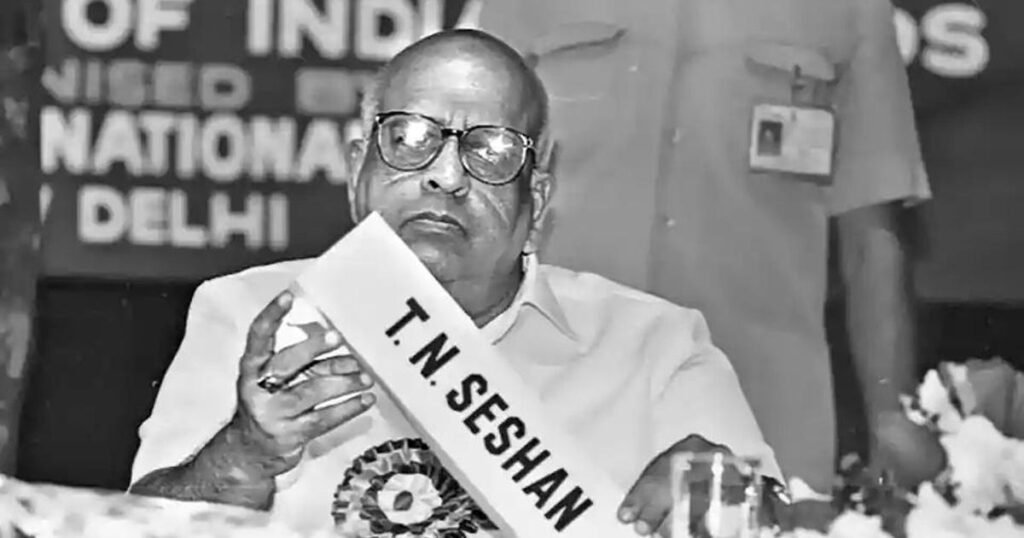
A man appeared not out of nowhere, but gained immense headlines in the 90s; he was an IAS of the 1955 batch from the Tamil Nadu cadre. Born on May 15, 1933, in Kerala’s Palghat. Tirunellai Narayana Iyer Sheshan, or famously known as T.N. Seshan, is widely regarded as the man who single-handedly changed the face of the Indian election system in the 1990s.
Rise to ‘Fear’dom
Sheshan was appointed as Chief Election Commissioner by the then Prime Minister, Mr Chandra Shekhar, in 1991. This government was established after the assassination of the former Prime Minister Rajiv Gandhi. When he was assassinated, the country was already at the polls, and in the wake of such a situation, the upcoming phases of the Lok Sabha elections were suspended. Looking at the magnitude of the situation, Sheshan did not even bother to look at the legal niceties of the action.
An interesting instance directly from the boardroom, where we get a meek glimpse of early Sheshan, in the bid to bring reforms in the election reforms from the grassroots, in 1992, he held a meeting in New Delhi, where District Election officers had come.
After the meeting began, five minutes later, a guy who happened to be the district magistrate from UP was asked to leave and was also fired from his duties as the district election officer. Like a cloud burst, Mr Sheshan displayed the precursor of what he will always be known as, a no-nonsense tolerance man.
The next day, something horrible happened: the agenda of the meeting flew out of the boardroom, which was quoted by a national newspaper at that time. This major lapse did not go well with him; he threatened to file a criminal case against the mischief-makers in the Supreme Court under the Official Secrets Act.

The precursor
Before he was appointed Chief Election Commissioner, Sheshan held various important positions in state and central administrations. He worked in district administrations, also handled critical departments in the Tamil Nadu secretariat, and later moved on to work in experienced positions in the Union Government. In his administrative capacity, Sheshan also served in the Department of Space and the Indian Space Research Organisation, and in the Ministry of Environment and Forests.
In 1989, Sheshan was elected to the highest bureaucratic position; he became the Cabinet Secretary of India. This role helped him gain the necessary insights into how political power interacts with the administrative bodies. What he and everyone else were unaware of was how Sheshan would learn these lessons by heart and put them into practice when he would become the Chief Election Commissioner.
The warning bell for politicians
Come the year 1990, Mr. Sheshan had gotten the opportunity and was elected to the position of the Chief Election Commissioner of India. No one knew how much this term of his as CEC was going to change Indian politics and administration.
When he took charge, the electoral malpractices were rampant: voter booth violence, voting scams, muscle power, impersonation, and total misuse of governmental machinery.
The voter lists were full of inaccuracies, the election campaign was unregulated, and the election commission had become toothless. The challenges that lay ahead of him were tough, but being a man made up of steel, he stood tall and ruthlessly dealt with these intersectional issues, with insurmountable patience.
What angered him the most was that for politicians, the elections, which are considered a serious business, were viewed as a playground. They played as they wanted, and Sheshan wanted to put things into place. He actually followed the code of conduct and punishment, and also very soon made these politicians realise that neither is he playing nor does he entertain their nonsense and bluffs.
His influence was such that politicians would fear him. And he himself had made this statement a few decades back: “I eat politicians for breakfast.”

Reforms to the election system
- Electors Photo Identity Card (EPIC) – The photo identity cards were introduced by Mr. Sheshan to curb the increasing number of impersonations and frauds by introducing EPIC in 1993. Though it took years to implement this throughout the nation, it was successful.
- Curbing campaign expenditure and practices – ‘daaru aur chicken’, a few of the most used election bribes, extravagant rallies, and blind spending on rally preparations were left unchecked, which turned problematic over time. To root out this problem from the very soil, Sheshan brought practices of getting permissions from the authorities before doing any rally. Additionally, he restricted the use of graffiti, posters, and loudspeakers for election campaigning.
- Polling booth with security – Polling violence was getting very prevalent. Therefore, Sheshan started assigning the army the work to guard the polling booths and oversee the smooth conduct of elections.
- From underdog to place of prestige – The Election Commission has been under the radar for being spineless and sometimes letting utter criminals conduct elections. Through his reforms, he elevated the position of the Election Commission by curbing the rise of these malpractices.
There have been instances when he even cancelled elections due to the rise of malpractices. Former Tamil Nadu Chief Minister Jayalalitha had called T.N. Seshan ‘the embodiment of arrogance’, but such a kind of arrogance that is channelled in the right direction is needed more than anything else today, when once again the country is discussing the ‘Vote Chori’.
In 1993, P. V. Narasimha Rao-led Congress government passed an ordinance and got the President’s assent under Article 342(2)[3] to deploy two Election Commissioners and subsequently appointed M. S. Gilman, S. N. G. V. G. Krishnamurthy as his fellows.
Sheshan cried foul, saying it was an effort to curb documbusters, and filed a petition to the SC. However, the top court dismissed his petition and said, “the concept of plurality is writ large on the face of Article 324, clause (2) whereof clearly envisages a multi-member Election Commission comprising the CEC and one or more ECs.”

Reforms to the election system
In 1996, after his term ended, he retired from administrative life. Though he contested for the Presidential post in 1997 from the opposition side, he lost. Later, he returned to solitude but occasionally appeared to deliver speeches on democracy. He has also written a book, ‘The Degeneration of India’ (1995). And wrote his autobiography, “Through the Broken Glass”. On November 10, 2019, T.N. Sheshan passed away, leaving behind nothing but an impact on Indian administration and politics that none could even reach, even till this day.
Written by – Mokshi Gala
Edited by – Rubina Shaikh
The post The Legacy of T.N. Sheshan appeared first on The Economic Transcript.

